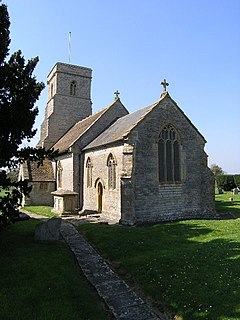Lovington, Somerset
| Lovington | |
|---|---|
 Church of St Thomas of Canterbury, Lovington |
|
| Lovington shown within Somerset | |
| Population | 141 (2011) |
| OS grid reference | ST595305 |
| District | |
| Shire county | |
| Region | |
| Country | England |
| Sovereign state | United Kingdom |
| Post town | Castle Cary |
| Postcode district | BA7 |
| Dialling code | 01963 |
| Police | Avon and Somerset |
| Fire | Devon and Somerset |
| Ambulance | South Western |
| EU Parliament | South West England |
| UK Parliament | |
Lovington is a village and civil parish in Somerset, England, situated 3 miles (4.8 km) south west of Castle Cary, between the River Brue and River Cary, in the South Somerset district. The parish, which includes the hamlet of Wheathill, has a population of 141.
The name of the village comes from Old English meaning Lufa's settlement.
There was a mill on the River Brue in the village at the time of the Domesday Book, when it was held by Serlo de Burci, however it is not certain whether this is the same site as the current Lovington Mill which was built around 1800.
The parish of Lovington was part of the hundred of Catsash, while Wheathill was part of the Whitley Hundred.
The village school was built in the early 19th century, and was helped later in the century, with donations and equipment, by the local priest and hymn writer Godfrey Thring.
The parish council has responsibility for local issues, including setting an annual precept (local rate) to cover the council’s operating costs and producing annual accounts for public scrutiny. The parish council evaluates local planning applications and works with the local police, district council officers, and neighbourhood watch groups on matters of crime, security, and traffic. The parish council's role also includes initiating projects for the maintenance and repair of parish facilities, as well as consulting with the district council on the maintenance, repair, and improvement of highways, drainage, footpaths, public transport, and street cleaning. Conservation matters (including trees and listed buildings) and environmental issues are also the responsibility of the council.
...
Wikipedia

